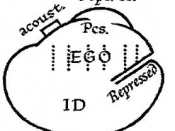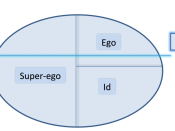Within Joseph Conrad's Heart of Darkness, Marlow asserts that "the mind of man is capable of anything--because everything is in it, all the past as well as all the future" (HOD 109.) As Marlow journeys deeper into the Congo he is forced to adapt to the jungle environment and in the process he begins to lose his understanding of societal rules and ideals. His "psychological self" is coerced into adapting to the rustic environment of the Congo hence disturbing the balance between his id, ego and superego. William Golding's Lord of the Flies similarly deals with this deteriorating awareness of societal standards in foreign environments, but does so with a group of young boys on an uninhabited island. Throughout Joseph Conrad's Heart of Darkness and William Golding's Lord of the Flies Marlow, Kurtz and the boys clearly demonstrate the capacity of the human mind in reflection to the principles of Sigmund Freud according to his definition of the id, ego and superego.
In Heart of Darkness, Marlow demonstrates the capability of the human mind as he makes his journey up the Congo River and adapts to the savage environment that surrounds him. While adapting to his environment, Marlow begins to disregard societal standards and hence his "psychological sense" is altered in that Marlow's ego and super ego subside in his overall nature, resorting to the "pleasure principle" that we now call the id. Marlow's id begins to cease control of his personality and his innate instinctive nature is released. It is this imbalance of his "psychological self" which acts as an instigator for the evil found in him and all men. When Marlow states that "Going up that river was like traveling back to the earliest beginnings of the world," (HOD 105) he is trying to depict his journey...


